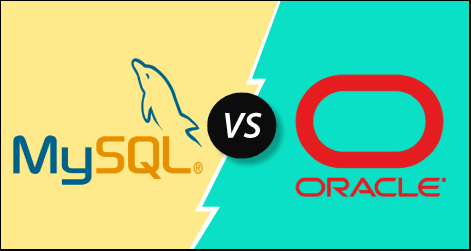Difference between MySQL and Oracle
MySQL and Oracle are the two famous relational databases that are used in small and big companies. Although Oracle Corporation supports both databases, they also have a lot of differences. Oracle is the more powerful software in comparison to MySQL. In this section, we are going to compare the differences between MySQL and Oracle database systems based on the various parameters.
What is MySQL?
MySQL is the popular database management system used for managing the relational database. It is open-source database software, which is supported by Oracle Company. It is fast, scalable, and easy to use database management system in comparison with Microsoft SQL Server and Oracle Database. It is commonly used with PHP scripts for creating powerful and dynamic server-side or web-based enterprise applications.
It is developed and supported by the Swedish Company, MySQL AB, and written in C and C++ programming languages. Many small and big companies use MySQL. MySQL supports many Operating Systems like Windows, Linux, MacOS, etc. with C, C++, and Java languages.
Features of MySQL Database
The essential features of the MySQL database are given below:
- MySQL is a relational database management system and easy to use. We can build and interact with MySQL by using only a few simple SQL statements.
- It is secure because passwords are encrypted in MySQL.
- It follows a client /server architecture.
- It is free and open-source.
- It is scalable.
- It allows transactions to be rolled back, commit, and crash recovery.
- It provides high performance, high flexibility, and high productivity.
What is Oracle?
Oracle is a relational database system that provides self-driving, self-securing, self-repairing, and designed to eliminate error-prone manual database management. Oracle is a cross-platform database system which can run on the various operating system. It allows to store and retrieve data quickly and safely. It is available free for the student but cannot use for commercial purposes. It is the first database software developed for business purposes to manipulate data using a query language. Oracle was released in 1980 with basic SQL features. This software is scalable, portable, distributed, and programmable.
Features of Oracle Database
The essential features of an Oracle database are given below:
- Oracle database is a cross-platform because it can run on various operating systems such as Windows, Linux, Mac, etc.
- It supports a logical database structure that allows interacting with the database without knowing the physical storage of your data.
- It is scalable, portable, distributed, and programmable.
- It can handle a large amount of data quickly.
- It supports ACID property that allows us to maintain the integrity and reliability of your data.
- Oracle has networking stacks that enable us to communicate applications across the different platforms with oracle database smoothly.
- It has a recovery manager tool that provides cold, hot, and incremental database backups and recoveries.
MySQL vs. Oracle
Let us summaries the popular differences between MySQL and Oracle in the tabular form given below:

| Comparison Basis |
MySQL |
Oracle |
| Introduction |
It is an open-source, cross-platform relational database management system built by Swedish Company MYSQL AB and currently supported by the Oracle. |
Oracle is a relational database system (RDBMS) that implements object-oriented features. It allows to store and retrieve data quickly and safely. It can handle a large amount of data. |
| Release |
It was released in 1995. |
It was released in 1980. |
| Cost |
It is free and open-source. It is licensed under the GNU. |
It is licensed for commercial purposes, but it provides the express edition for free. The express edition is recommended for students only. |
| Scalability |
MySQL database is used for small and big businesses. |
Oracle database is used for very large scale deployments. |
| Data Partitioning |
It does not support data partitioning. |
It supports data partitioning. |
| Security |
It requires a username, password, and host to access the database. |
It requires a username, password, and profile validation to access the database. |
| System Type |
It only works with the static system. |
It can work with both static and dynamic systems. |
| Null Value |
MySQL supports the null value. |
Oracle does not support the null value. |
| Character |
MySQL support only two characters that are CHAR and VARCHAR. |
Oracle supports four different characters that are CHAR, VARCHAR2, NCHAR, and NVARCHAR2. |
| Backup Mechanism |
It offers only two backup mechanisms that are mysqlhotcopy and mysqldump. |
It offers many backup mechanisms that are backup, hot backup, import, export, etc. |
| XML Support |
It does not support XML. |
It supports XML. |
| Storage Features |
It contains only a few storage features like tablespace, synonym, packages, and many others. |
It supports many storage features that are tablespace, synonym, packages, etc. |
| Locking facility |
MySQL has only a table locking facility. |
Oracle has table locking as well as a row locking facility. |
| Language support |
MySQL support only SQL language. |
Oracle supports both SQL and PL/SQL languages. |
| Operating System Support |
It supports the following Operating System:
- Windows
- Mac OS X
- Linux
- UNIX
- z/OS
- BSD
- Symbian
- AmigaOS
|
It supports the following Operating System:
- Windows
- Mac OS X
- Linux
- UNIX
- z/OS
|
|

 For Videos Join Our Youtube Channel: Join Now
For Videos Join Our Youtube Channel: Join Now









